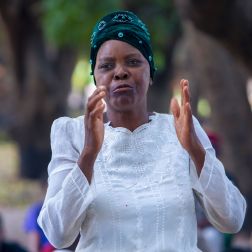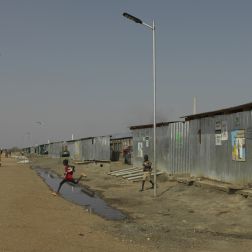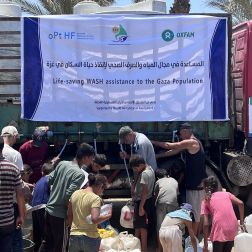- 5 mins read time
- Published: 19th June 2020
Tedy, Mali

The music has stopped in the heart of the desert, the savannahs, and forests of the Sahel and the Central African Republic - taking with it the joy of better days. Fear has spread across the region, and people are facing it on two fronts: firstly, where armed groups devastate villages, driving more than five million people to flee their homes. Secondly, the rise of COVID-19 is creating additional fear and uncertainty amongst communities.
And for the majority of displaced women, their dance partners have also disappeared. Many men of working age have been killed by armed groups, disappeared or have left in search of a better future. In Burkina Faso, women and children represented 84 per cent of the displaced population. Women find themselves in extremely precarious situations, struggling for their survival and for those depending on them. Many bear the scars – visible and invisible - of acts of violence. In the Central African Republic, a woman is victim of sexual and gender-based violence almost every hour.
These Sahelian and Central African women are hundreds of thousands, survivors and heroes - waiting for music to resume in their lives. Whilst they do not sing, they still have their stories, and hope, to imagine another future.
A team of female humanitarian workers with Oxfam collected the following stories. They are accompanied by illustrations made by the artist Sophie Le Hire, who has lived in Senegal for four years and who, in her artistic approach, proudly carries the voice of women, whom she considers as "giants". By juxtaposing two styles, she illustrates the reality of the present and the dream for the future of these women

Tedy, Mali
"I want my children to get an education worthy of the name, to be one day part of the elite in this country."
My name is Tedy, I am 40 years old, I am Malian, native of the region of Mopti in the Center of Mali.
Because of the violence, I had to flee my village, and I live today with other displaced people who have known the same fate, on a site near the capital.
Before the conflict, I was selling milk and I was also a hairdresser. I took care of my family and even managed to save money.
But one day, as intercommunal violence became more and more serious, we were forced to flee, to leave my house with my children, taking only my phone and the clothes I was wearing. We had to take a very long route to arrive in Bamako, forced to pass through Ouagadougou and stayed more than two days without eating anything. I had no money and without the help of one of my daughters who works in the capital, I don't know what would have become of us.
I haven't had a chance to study and the struggle of my life is to send my children to school. I will do my best to make them the most influential people in our community and even in Mali! Access to education is a right for every child.
Shortly after arriving at the site, I was appointed President of the displaced women because I speak the national Bambara language, so I can easily speak to the authorities. It was a big responsibility. I talked a lot with the other women, and we decided to develop activities to earn a living. I got the necessary support so that we were trained in making soaps and dyes, as well as in the practice of traditional henna and hairdressing. In Bamako, there are really a lot of weddings and we thus had the opportunity to put into practice what we had learned.
Like others, I am a mother and I take care of my children alone. At the beginning, I had started a small condiment business, it worked a little, but alone and with my children to take care of, I did not manage and I had to give it up. Together with the other women, it became possible.
Unfortunately, with Coronavirus disease, all of our activities have stopped. We hope this disease will pass quickly so that we can take control of our lives again. Here on the site, we protect ourselves against the disease by respecting the barrier measures decreed by the health authorities and we have received hand-washing kits.
I can’t imagine the future. We would like to return home, but the conflict persists and we are afraid of endangering the lives of our children. It is for them that every day I find the courage to fight and to encourage other women to do it too, we have a duty to guide our children on the path to a better future. In my dreams, this path is education and I will continue to believe in it and hope for it.
Interview by Sitan Coulibaly, Oxfam in Mali.
Oxfam’s response
In the Sahel and the Central African Republic, Oxfam provides humanitarian aid and carries out advocacy actions for communities affected by large-scale humanitarian crises. Women and girls are the most exposed in crisis and it is fundamental that their specific needs and their protection are at the heart of humanitarian responses. Women also play a major role in developing social cohesion and peacebuilding.
Oxfam and its local partners provide humanitarian aid to more than 400,000 internally displaced people (IDPs) and host communities in the region, in terms of food aid, access to water, hygiene and sanitation and to protect the most vulnerable, especially women and girls. Oxfam also work alongside communities in conflict transformation programs to foster cross-border dialogues and the inclusion of women and young people in peacebuilding processes.
Since the arrival of the COVID-19, Oxfam has adapted its programs to protect the poorest and most vulnerable against this new threat. Oxfam also distribute hygiene kits to schools and health professionals and take action to ensure clean and safe water continues to flow.




